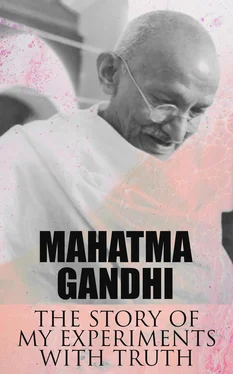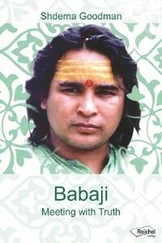‘I shall think myself blessed only when I see Him
in every one of my daily acts;
Verily He is the thread,
which supports Muktanand’s life.’
Raychandbhai’s commercial transactions covered hundreds of thousands. He was a connoisseur of pearls and diamonds. No knotty business problem was too difficult for him. But all these things were not the centre round which his life revolved. That centre was the passion to see God face to face. Amongst the things on his business table there were invariably to be found some religious book and his diary. The moment he finished his business he opened the religious book or the diary. Much of his published writings is a reproduction from this diary. The man who, immediately on finishing his talk about weighty business transactions, began to write about the hidden things of the spirit could evidently not be a businessman at all, but a real seeker after Truth. And I saw him thus absorbed in godly pursuits in the midst of business, not once or twice, but very often. I never saw him lose his state of equipoise. There was no business or other selfish tie that bound him to me, and yet I enjoyed the closest association with him. I was but a briefless barrister then, and yet whenever I saw him he would engage me in conversation of a seriously religious nature. Though I was then groping and could not be said to have any serious interest in religious discussion, still I found his talk of absorbing interest. I have since met many a religious leader or teacher. I have tried to meet the heads of various faiths, and I must say that no one else has ever made on me the impression that Raychandbhai did. His words went straight home to me. His intellect compelled as great a regard from me as his moral earnestness, and deep down in me was the conviction that he would never willingly lead me astray and would always confide to me his innermost thoughts. In my moments of spiritual crisis, therefore, he was my refuge.
And yet in spite of this regard for him I could not enthrone him in my heart as my Guru. The throne has remained vacant and my search still continues.
I believe in the Hindu theory of Guru and his importance in spiritual realization. I think there is a great deal of truth in the doctrine that true knowledge is impossible without a Guru. An imperfect teacher may be tolerable in mundane matters, but not in spiritual matters. Only a perfect gnani 13deserves to be enthroned as Guru. There must, therefore, be ceaseless striving after perfection. For one gets the Guru that one deserves. Infinite striving after perfection is one’s right. It is its own reward. The rest is in the hands of God.
Thus, though I could not place Raychandbhai on the throne of my heart as Guru, we shall see how he was, on many occasions, my guide and helper. Three moderns have left a deep impress on my life, and captivated me: Raychandbhai by his living contact; Tolstoy by his book, The Kingdom of God is within you; and Ruskin by his Unto this Last. But of these more in their proper place.
Table of Contents
My elder brother had built high hopes on me. The desire for wealth and name and fame was great in him. He had a big heart, generous to a fault. This, combined with his simple nature, had attracted to him many friends, and through them he expected to get me briefs. He had also assumed that I should have a swinging practice and had, in that expectation, allowed the household expenses to become top-heavy. He had also left no stone unturned in preparing the field for my practice.
The storm in my caste over my foreign voyage was still brewing. It had divided the caste into two camps, one of which immediately readmitted me, while the other was bent on keeping me out. To please the former my brother took me to Nasik before going to Rajkot, gave me a bath in the sacred river and, on reaching Rajkot, gave a caste dinner. I did not like all this. But my brother’s love for me was boundless, and my devotion to him was in proportion to it, and so I mechanically acted as he wished, taking his will to be law. The trouble about readmission to the caste was thus practically over.
I never tried to seek admission to the section that had refused it. Nor did I feel even mental resentment against any of the headmen of that section. Some of these regarded me with dislike, but I scrupulously avoided hurting their feelings. I fully respected the caste regulations about excommunication. According to these, none of my relations, including my father-in-law and mother-in-law, and even my sister and brother-in-law, could entertain me; and I would not so much as drink water at their houses. They were prepared secretly to evade the prohibition, but it went against the grain with me to do a thing in secret that I would not do in public.
The result of my scrupulous conduct was that I never had occasion to be troubled by the caste; nay, I have experienced nothing but affection and generosity from the general body of the section that still regards me as excommunicated. They have even helped me in my work, without ever expecting me to do anything for the caste. It is my conviction that all these good things are due to my non-resistance. Had I agitated for being admitted to the caste, had I attempted to divide it into more camps, had I provoked the castemen, they would surely have retaliated, and instead of steering clear of the storm, I should, on arrival from England, have found myself in a whirlpool of agitation, and perhaps a party to dissimulation.
My relations with my wife were still not as I desired. Even my stay in England had not cured me of jealousy. I continued my squeamishness and suspiciousness in respect of every little thing, and hence all my cherished desires remained unfulfilled. I had decided that my wife should learn reading and writing and that I should help her in her studies, but my lust came in the way and she had to suffer for my own shortcoming. Once I went the length of sending her away to her father’s house, and consented to receive her back only after I had made her thoroughly miserable. I saw later that all this was pure folly on my part.
I had planned reform in the education of children. My brother had children, and my own child which I had left at home when I went to England was now a boy of nearly four. It was my desire to teach these little ones physical exercise and make them hardy, and also to give them the benefit of my personal guidance. In this I had my brother’s support and I succeeded in my efforts more or less. I very much liked the company of children, and the habit of playing and joking with them has stayed with me till today. I have ever since thought that I should make a good teacher of children.
The necessity for food ‘reform’ was obvious. Tea and coffee had already found their place in the house. My brother had thought it fit to keep some sort of English atmosphere ready for me on my return, and to that end, crockery and such other things, which used to be kept in the house only for special occasions, were now in general use. My ‘reforms’ put the finishing touch. I introduced oatmeal porridge, and cocoa was to replace tea and coffee. But in truth it became an addition to tea and coffee. Boots and shoes were already there. I completed the Europeanization by adding the European dress.
Expenses thus went up. New things were added every day. We had succeeded in tying a white elephant at our door. But how was the wherewithal to be found? To start practice in Rajkot would have meant sure ridicule. I had hardly the knowledge of a qualified vakil and yet I expected to be paid ten times his fee! No client would be fool enough to engage me. And even if such a one was to be found, should I add arrogance and fraud to my ignorance, and increase the burden of debt I owed to the world?
Friends advised me to go to Bombay for some time in order to gain experience of the High Court, to study Indian law and to try to get what briefs I could. I took up the suggestion and went.
Читать дальше












